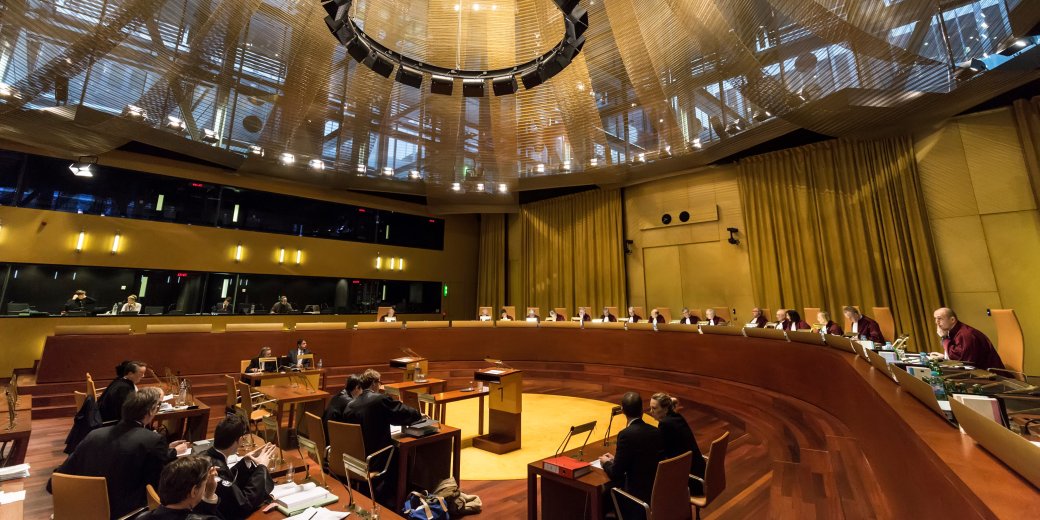On 10 September 2020 the British Advocate General at the Court of Justice of the European Union, Eleanor Sharpston, was replaced by the Greek lawyer Athanasios Rantos. After having been a member of the ECJ since the mid-2000s, she was lastly re-appointed in the spring of 2015 for a further six year term of office until 6 October 2021. In her view, she could not be removed during that period, notwithstanding Brexit. Whereas the judges nominated by the UK, Christopher Vajda of the ECJ and Ian Forrester of the General Court, left Luxembourg without further ado on Brexit Day (1 February 2020), Ms. Sharpston refused to quit claiming that there was a difference between the leave situation of a Judge and that of an Advocate General. Her line of argument was supported by a number of scholars.
The circumstances of the expulsion of AG Sharpston from the ECJ were unusual, to put it mildly. On 7 April 2020, she sued Council and the ECJ. On 2 September 2020, the 27 EU Member States appointed Mr. Rantos as new AG. Mr. Rantos was supposed to take the oath and to start his term on 7 September 2020. Two days later, on Friday 4 September 2020, Judge Anthony Collins of the General Court ordered the suspension of operation and all consequential effects of the decision, in so far as it purported to appoint Mr. Rantos to the position of AG. On 10 September 2020, ECJ Vice-President Rosario Silva de Lapuerta issued two orders annulling Judge Collins’ decision of 4 September 2020. There was no formal prior notice nor was it made public that an appeal had been lodged against Judge Collins’ decision. This means that Ms. Sharpston was not given an opportunity to comment. The Vice-President essentially argued that the Member States’ decision was not subject to judicial review and that, prima facie, Ms. Sharpston’s actions had no prospect of success. On 5 September 2020, both the Council and the Representatives of the Governments of the Member States had appealed against Judge Collins’ order. Immediately after the delivery of the two orders of the Vice-President of the ECJ, Mr. Rantos was sworn in to his office with no ceremony.
Most commentators focus on the question whether the termination of Ms. Sharpston’s term of office was lawful. This issue is left open here. The following considerations examine the legal situation in the event that her expulsion from the ECJ was in line with EU law. A precedent of the EFTA Court (which operates without an Advocate General) from 2017 may be relevant in this context. EFTA Court case law has been taken into account in the interpretation of EU law on countless occasions.
The Christiansen affair
In December 2016, the Governments of the EEA/EFTA States decided, following a proposal from Norway, to re-appoint the Norwegian judge of the EFTA Court, Per Christiansen, for an abridged term of three years only instead of the six years provided for in the ESA Court Agreement. In a newspaper interview two months earlier, the then President had stressed that such a course of action would be illegal. Following a complaint from six Norwegian scholars, ESA initiated infringement proceedings. Two of the scholars, Professors Mads Andenæs and Eirik Bjorge, lodged a second complaint shortly after. A few days later, the Liechtenstein Court of Appeal referred Case E-21/16 Nobile to the EFTA Court and posed, inter alia, the question whether judgments reached with the participation of an improperly appointed judge, would be valid. The Norwegian Judges Association protested and on 13 January 2017, the EEA/EFTA States repealed their decision of December 2016 and re-appointed the Norwegian judge for a term of six years.
The EFTA Court made it nevertheless clear in a decision of 14 February 2017 in Nobile that if a judge appointed for only three years would be part of the bench, the latter would not be lawfully composed. The President confirmed that view in a procedural order of 20 February 2017 where he further elaborated on the issue of the lawful composition of the bench. In paragraph 30 of the order, the President stated that appointment and re-appointment for a fixed six years term “constitutes a minimum protection of judicial independence. It is an essential part of the judicial constitution (known in German as Gerichtsverfassung) of the EFTA pillar. The right to a six-year term cannot be waived by individual judges”.
Applying the doctrine to Sharpston?
If one were to apply the EFTA Court’s case law to the Sharpston matter, interesting questions would arise. One day after the UK left the EU, on 1 February 2020, the President of the ECJ wrote to the Council that there was a ‘vacancy’, which the EU Member States should fill by appointing a new Advocate General. The term ‘vacancy’ can only be understood to mean that the position previously occupied by Ms. Sharpston was empty. However, Ms. Sharpston continued to be assigned cases in the following months. That means that she was kept busy for the time being without a fixed term of office. In particular, on 30 April 2020 she delivered a landmark opinion in Case C-693/18 CLCV and Others (Dispositif d’invalidation sur moteur diesel), which concerns the question whether a device which influences the operation of the emission control system of diesel motor vehicles during registration tests constitutes a “defeat device” prohibited by EU law. This case is currently pending before the ECJ.
One may therefore raise the question of whether the ECJ was lawfully composed in the period between the UK’s departure from the EU on 31 January 2020 and the removal from the ECJ of AG Sharpston on 10 September 2020. If the EFTA Court’s case law were to be transposed to EU law, the answer to this question would most probably be no. Admittedly, an Advocate General, unlike a Judge, is not a decision maker. Nonetheless, even if they do not take part in the judgment, Advocates General are full members of the ECJ. They play a central role in the finding of justice based on the same legal guarantees and requirements as the Judges. If an Advocate General whose independence is impaired takes part in the proceedings, the decision-making process is not proper.
It cannot be argued that Ms. Sharpston’s case is simply a case of application of Articles 5 and 8 of the ECJ’s Statute, according to which an AG “shall continue to hold office until his successor takes up his duties”. Article 5 of the Statute deals with the “normal” replacement or resignation of an office holder. Unless Article 6 applies, he/she should continue to hold office until a successor takes up his/her duties. As far as Ms. Sharpston is concerned, one cannot, on the one hand, ipso facto lose one’s mandate on Brexit Day and at the same time be protected by the Statute. If one refers to Article 6 of the Statute, we would be faced with a case in which the incumbent “no longer fulfills the requisite conditions”. In that case Article 5 is no longer applicable.
In retrospect, it can be said that the EFTA Court has ruled properly in the Christiansen case. ESA, the Liechtenstein Court of Appeal and the Norwegian complainants have made substantial contributions to this outcome which strengthened the rule of law. However, it is now time for the Norwegian Government to abandon its opposition to the creation of a supranational panel which would scrutinise the suitability and independence of judge candidates proposed by the individual EEA/EFTA States. Liechtenstein and Iceland have years ago indicated that they would be open-minded in that regard. On this point, there is a cultural gap in the EFTA pillar of the EEA as compared to the EU pillar.






.png)





























